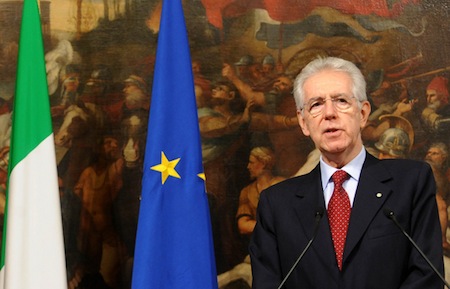It’s been an incredibly fast-moving weekend for Italian politics — shortly after Silvio Berlusconi announced he would return to the leadership of his floundering Popolo della Libertà (PdL, People of Freedom) on Saturday, prime minister Mario Monti announced that he would resign as prime minister upon the completion of Italy’s 2013 budget, meaning that the next Italian election could come sooner than April 2013 as previously planned.![]()
Monti’s resignation is not the incredible bombshell that it seems — it will still take some time to pass the 2013 budget, and the coalition that supports Monti, comprised of the PdL and the center-left Partito Democratico (PD, Democratic Party), seem likely to provide support for that budget. Earlier today, after the Italian stock market dropped and Italian bond yields crept upwards to around 4.8%, Monti reassured global markets and Italians alike that he would continue to govern through the next election. Monti was appointed prime minister in November 2011 after Berlusconi’s government found itself in the throes of a crisis of confidence over Italian fiscal policy with bond yields of over 7%, not to mention the corruption and sex scandal that had enveloped Berlusconi in his final years in office.
Monti has spent much of 2012 passing budget cuts, tax increases and market reforms through Italy’s parliament — Monti remains well-respected in Italy, although his austerity measures in particular have become increasingly unpopular. As such, the upcoming Italian election was always going to determine the outcome of Monti’s reforms, and it will fall to the next government to consolidate and continue Monti’s reforms. Indeed, Italy had already started turning toward election season, and although Monti is not running in his own right, he has indicated he could return to lead a second Monti government in the event, not unlikely, of a hung Italian parliament.
The PD, together with a handful of smaller leftist allies, selected just eight days ago the broad center-left’s candidate for prime minister, the PD’s current leader, Pier Luigi Bersani, in a race that saw much of Italy cheering on the youthful, energetic mayor of Florence, Matteo Renzi. Although Bersani has emphasized the importance of stimulating economic growth and creating more jobs, he’s largely indicated he would continue Monti’s broad path of fiscal readjustment.
Earlier in November, a handful of business leaders formed a new coalition, Verso la Terza Repubblica (VTR, Toward the Third Republic), a centrist group that will run in the 2013 election for the express purpose of returning Monti to government. Its leaders include Ferrari CEO, former Fiat CEO and former president of Confindustria (Italy’s employer’s federation), Luca Cordero di Montezemolo. A handful of smaller parties are also contesting the election in their own right, ranging from autonomist parties in Italy’s north and Italy’s south, the remnants of Italy’s old Christian Democrats, and parties ranging from fervently communist to nearly neofascist.
So, at most, Monti’s imminent resignation will accelerate the Italian election to February.
In one sense, that’s good news for Berlusconi’s opponents — the less time that Berlusconi has, with his ample amount of money and media power, to attack Monti’s reforms and his leftist opponents, the less likely it is that Berlusconi can turn around polls that show the PdL in third place, behind the PD and behind blogger Beppe Grillo’s anti-austerity Movimento 5 Stelle (M5S, the Five Star Movement).
On the other hand, the PdL was set to contest regional elections on February 10 and 11 in Lombardia (in northern Italy and home to Italy’s financial and fashion capital, Milan) and in Lazio (in central Italy and the region surrounding Italy’s capital, Rome), and losses in those elections could have been even more embarrassing in advance of a later spring vote. In Lombardia, Roberto Formigoni, who has served as regional president since 1995, announced the dissolution of the regional legislature after one of his PdL allies was arrested on the charge that he bought votes from the southern organized crime organization ‘Ndrangheta in the 2010 regional elections. In Lazio, the PdL’s Renata Polverini resigned as regional president after just three years in office after being implicated in a public expenses scandal.

One thought on “Monti resigns as prime minister in light of Berlusconi’s political return”